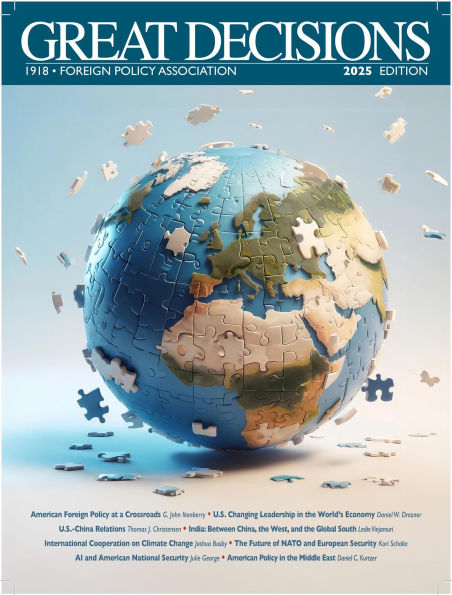Prepare to Discuss the World!
Mondays, 2:00 – 3:30 pm
March 3–24
Great Decisions, produced by the Foreign Policy Association (FPA), is America’s largest foreign affairs education and discussion program. Launched in Portland, Oregon in 1954, the program gained media attention, was picked up by local schools, and soon gained national attention.
Each week the group will discuss a timely global topic of great importance to Americans, and participants will have the opportunity to offer their opinions on each topic through an online survey. Attend all four sessions or choose your favorite topics; no registration is required. This is your chance to have your voice heard!
A reference copy of the Great Decisions 2025 Briefing Book is available to view and copy in the library, and another is available for short-term loan. You may purchase your own Briefing Book for $35 through the Foreign Policy Association website.
NEW! Get the Great Decisions FREE Briefing eBook through Libby.


Great Decisions at the Jefferson County Library has been facilitated since 2013 by Joyce Francis, Ph.D. Joyce taught International Relations at George Mason, Tulane, and American University before moving to the Olympic Peninsula. For further information about the Great Decisions 2025 program, contact Dr. Joyce Francis.
Discussion Topics
View the Great Decisions 2025 Overview
Monday, March 3 – America at a Global Crossroads
The U.S., polarized and divided, faces a world overflowing with challenges, dangers, and uncertainties. Conflict and disorder have become the defining features of world politics. Today participants will explore the contours of the U.S. foreign policy debate as it plays out in a world of multiple and escalating crises and domestic polarization.
Monday, March 10 – U.S. Changing Leadership of the World Economy
Under President Biden, the U.S. has advanced new ideas about trade, technology, industrial policy, competition with China, and the organization of the world economy. For most of the postwar era, the U.S. has tied its global leadership to cooperative agendas aimed at creating a more open-world trading system, but that has apparently come to an end. What are America’s options and opportunities as a leader of the world economy? How will America’s “foreign policy for the middle class” and strategic competition with China impact its leadership role? How can the postwar rules and institutions of the world economy be made safe for economic nationalism and great power competition?
Monday, March 17 – India: Between China, the West, and the Global South
India is an emerging major power in world affairs, occupying a pivotal position between China, the United States, and the Global South. Its population size, economy, and geopolitical location ensure that it will be an influential voice in debates and political struggles over global order. What are India’s choices and opportunities for regional and global leadership? How will it maneuver between China and the United States, and what is its role as a voice of the Global South? What opportunities exist for Washington to work with India?
Monday, March 24 – The Future of NATO and European Security
European security is more uncertain than it has been for decades. Putin’s Russia has launched a war with Ukraine on its doorstep, and America’s uncertain role as leader of NATO and security provider has been called into question with the failure of Congress to pass supplemental military support for Ukraine. What are Europe’s options, and how might developments on both sides of Western Europe – in Ukraine and across the Atlantic – impact its choices? What are America’s stakes in NATO and Europe’s strategic dilemmas?
This program series is co-sponsored by the Salish Sea Fellowship’s Adult Learning Program.